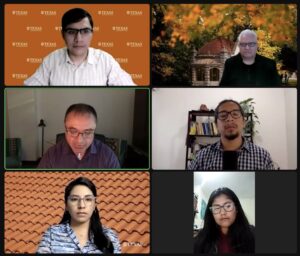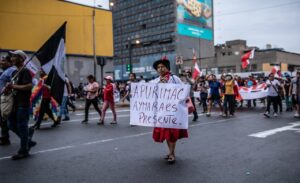
Webinar organized by Quechua doctoral students at the University of Texas at Austin. Panelists included: Jermani Ojeda-Ludena, Patricia Gutierrez, Jonathan Castro, and Serafín Coronel-Molina. Moderated by Katherin Tairo-Quispe and Jermani Ojeda-Ludena. (Credit: Screenshot)
By Athena Hawkins (*)
Quechua journalists and scholars condemned the Peruvian mainstream media’s coverage of Indigenous people amid widespread political protests that resulted in more than 60 deaths, since last December. In a webinar organized by Quechua doctoral students at the University of Texas at Austin, panelists said news outlets in the central region of Peru omitted mentioning police and military repression of Quechua and Aymara protestors in their coverage.
“This event seeks to present different voices to analyze the impacts of this crisis on the Quechua and Aymara peoples,” said Jermani Ojeda-Ludena, a Quechua doctoral candidate at UT Austin who co-moderated the webinar.
The other moderator and organizer of the webinar was Katherin Tairo-Quispe, who is also a Quechua doctoral student at UT Austin. The event was hosted by Ojeda-Ludena and Tairo-Quispe on Feb. 20 and the other panelists were Patricia Gutierrez, a Quechua radio broadcast journalist, Jonathan Castro, a Quechua political journalist and podcast editor and Serafín Coronel-Molina, a Quechua professor and academic.
Protests began last December, after a failed self-coup led by Peruvian President Pedro Castillo, who eventually was impeached and arrested. Since the ascension of Vice President Dina Boluarte to replace Castillo in the presidency, political demonstrations in several regions of Peru have called for Baluarte’s resignation, the dissolution of congress, early elections, and a new constitution.
Quechua is one of the languages of the originary peoples of the Andean region of South America and their language is the most spoken Indigenous language in the Americas, with around 8 million speakers in countries such as Peru, Ecuador, Colombia, Bolivia, and Argentina, according to the Penn Language Center.
Panelists said despite the large population of Quechua and Indigenous peoples in Peru, the majority of media outlets in the country fails to represent the issues that concern them, such as military and police repression and access to basic services.
Tairo-Quispe led a moment of silence in honor of the 60 people, most of whom were Quechua or Aymara, who lost their lives during the protests and related events.
Patricia Gutierrez, a radio broadcast journalist at Radio Onda Azul in the Puno region, said protestors in the region are labeled as “terrorists” for protesting against the current administration, but in reality, they seek government protection and representation.

National strike on Jan. 28, 2023, Lima, Peru. (Credit: Candy Sotomayor, CC BY-SA 4.0)
“These people have been accused of being terrorists — these groups of peasants and farmers. Why? To justify these human rights violations, to delegitimize their demands and to, maybe, scare people from protesting,” Gutierrez said.
Jonathan Castro, a political journalist and podcast editor for LaEncerrona, echoed Gutierrez’s statements about the Peruvian mass media’s biased coverage against protestors, saying that while the death and injury toll has grown, the delegitimizing narrative from Dina Boluarte’s administration and the mass media has remained the same.
“(Indigenous people) haven’t been given a voice, so they can’t express in their own words the reasons they are protesting. There is no representation,” Castro said. “The voice has been given to elected officials, to the governors of some of those regions.”
Castro provided examples of the Peruvian mass media’s omission of abuses against Indigenous populations, pointing to the contradiction between a headline from a popular news outlet and an official report from a human rights organization.
Amnesty International, a global NGO dedicated to human rights issues, published a report on Feb. 16 detailing the deadly state oppression against Indigenous peoples and peasants in Peru. A news organization owned by the Peruvian government, Andina, contradicted the Amnesty International report by publishing an article which framed their claims around positive messages, such as Dina Boluarte’s promise of “support packages'' for victims.
Tairo-Quispe told LatAm Journalism Review (LJR) that Indigenous people are disappointed in mainstream media coverage, which is centralized in Lima, Peru. The sentiment that the media does not represent Indigenous issues was one of the main triggers for the protests, she said.
“All the information (on the news) is showing the government's interests, they are just talking about ‘the government did this, the government did that,’” Tairo-Quispe said. “But not [about] the Indigenous struggles, not the police oppression, not the police brutality, and not those 60 people that passed away because of the crisis.”
Tairo-Quispe said the people should focus on alternative or independent media, or media outlets that are not controlled by the central regions of the country. However, these outlets do not receive the same financial resources as the mainstream outlets, because the government allocates public funding to the central news outlets which favor their policies, she said.
“They are monopolizing not only the media industry, but also monopolizing the political and social agenda in the country,” Tairo-Quispe said.
Serafín Coronel-Molina, a Quechua scholar and professor in the School of Education at Indiana University Bloomington, said the fight against centralized power, biased media narratives and historical oppression will require more organization on the part of Indigenous people.
“This is a moment for renovation, to change the representatives in government, the representatives in Congress, so that all the original peoples can have representation,” Coronel-Molina said.
“And if I say this, they’re gonna say, ‘Oh, he’s a terrorist,’” Coronel-Molina said. “It has nothing to do with it. I’m a democrat. 100%.”
The webinar, which was held in Spanish with translation to English, was hosted by the Native American and Indigenous Student Peoples Association (NAIPA), a graduate student organization at UT Austin which aims to make Indigenous people and their scholarship more visible. The event was also sponsored by the Native American and Indigenous Studies department (NAIS) at UT Austin, and supported by Quechua Tinkuy, an academic and community organization focused on the Quechua people and Quechua language.
–
* Athena Hawkins is a Journalism student at the University of Texas, reporting for the Press Freedom in Latin America class. Athena is a member of the Moody Honors Program and the Internal Director of Communication Council. She was previously a news reporter at The Daily Texan, and now works for the Moody Writing Support Program as a journalism coach.